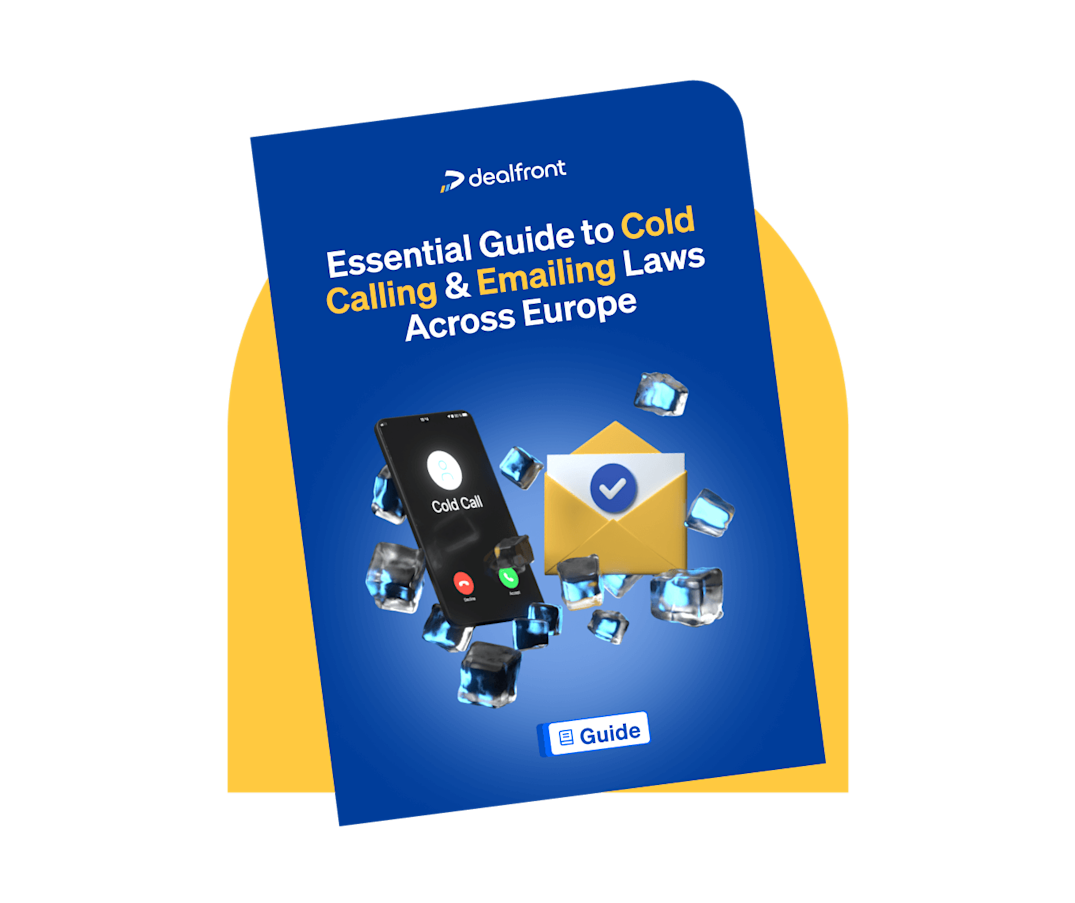60-Second Summary
To maximize your B2B sales efforts, it's essential to identify the actual decision-makers within a company—those with authority, budget power, or project approval rights. This article outlines tools and strategies to streamline that process and boost your conversion rates.
Always identify the decision-maker before your first B2B outreach: Don’t waste time with the wrong contact—target those who approve budgets or hold strategic authority.
Use Dealfront’s Sales Intelligence Platform: Shortcut research time, find filtered contact data, and access GDPR-compliant insights across Europe.
Make use of reliable free sources like company websites, business directories, and search engines: But be prepared for time-intensive digging and inconsistent data quality.
Leverage platforms like LinkedIn and XING as social selling tools: Connect directly with potential decision-makers and personalize your outreach using profile details and activity.
Isn’t that annoying? Well, it isn’t only a waste of time for you, but also serious from an economic point of view—after all, you have spent valuable time and energy on a conversation that you may need to have again. Only next time, you’ll hopefully be talking to the right contact aka. the decision-maker.
Let’s find out how you can find decision-makers in a company as well as important contacts for your B2B business.
What Defines a Decision-Maker in a Company?
If the situation described above sounds familiar to you, don’t worry. On the contrary! At least afterwards you know who the decision-maker in the company is and can proceed. For the future you can establish the following rule: Before your first sales conversation in B2B, always clarify who the decision-maker in a company is!
Decision-makers in a company usually have certain rights and more power than other employees. You could say that the right contact in a company is the person who approves the budget for your product. Or at least someone who usually approves projects and takes care of their release.
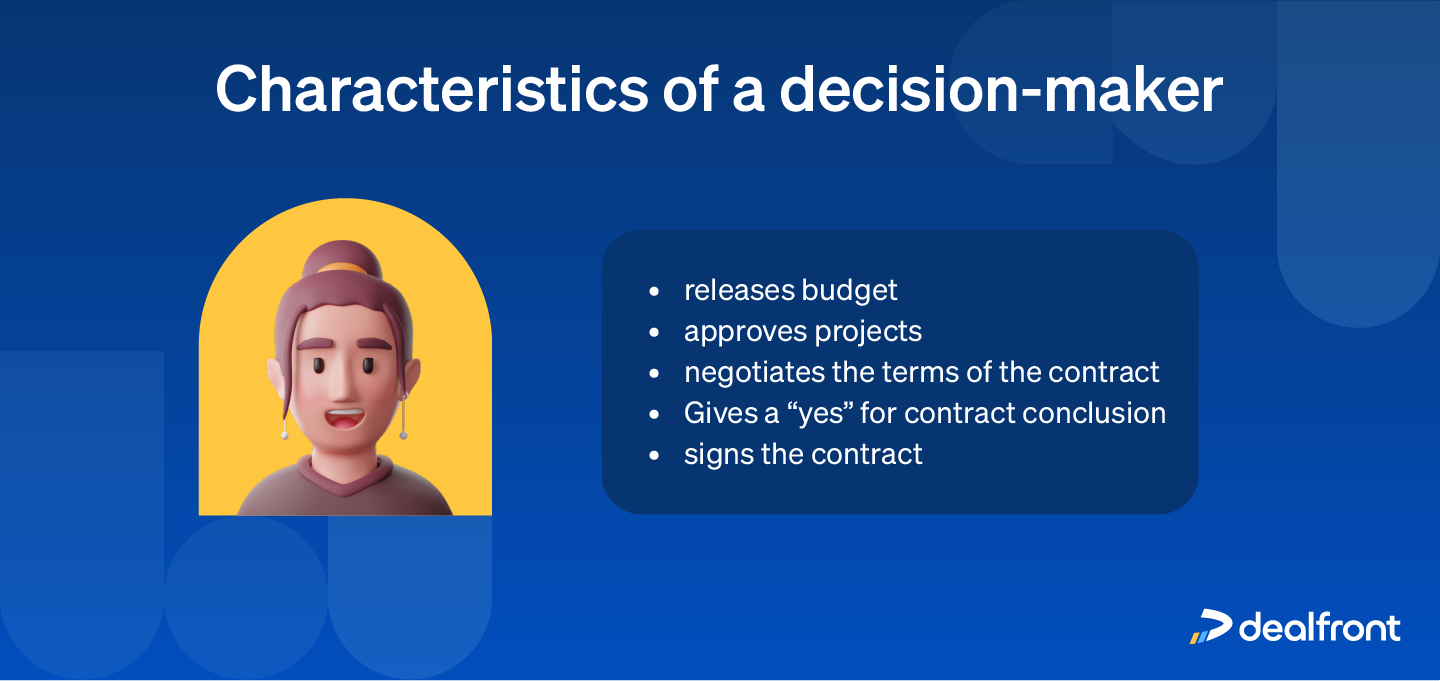
Your contact can be, for example, the user of the product, but the decision-maker in the company is still the one giving you a "yes" or a “no” for a contract in the end.
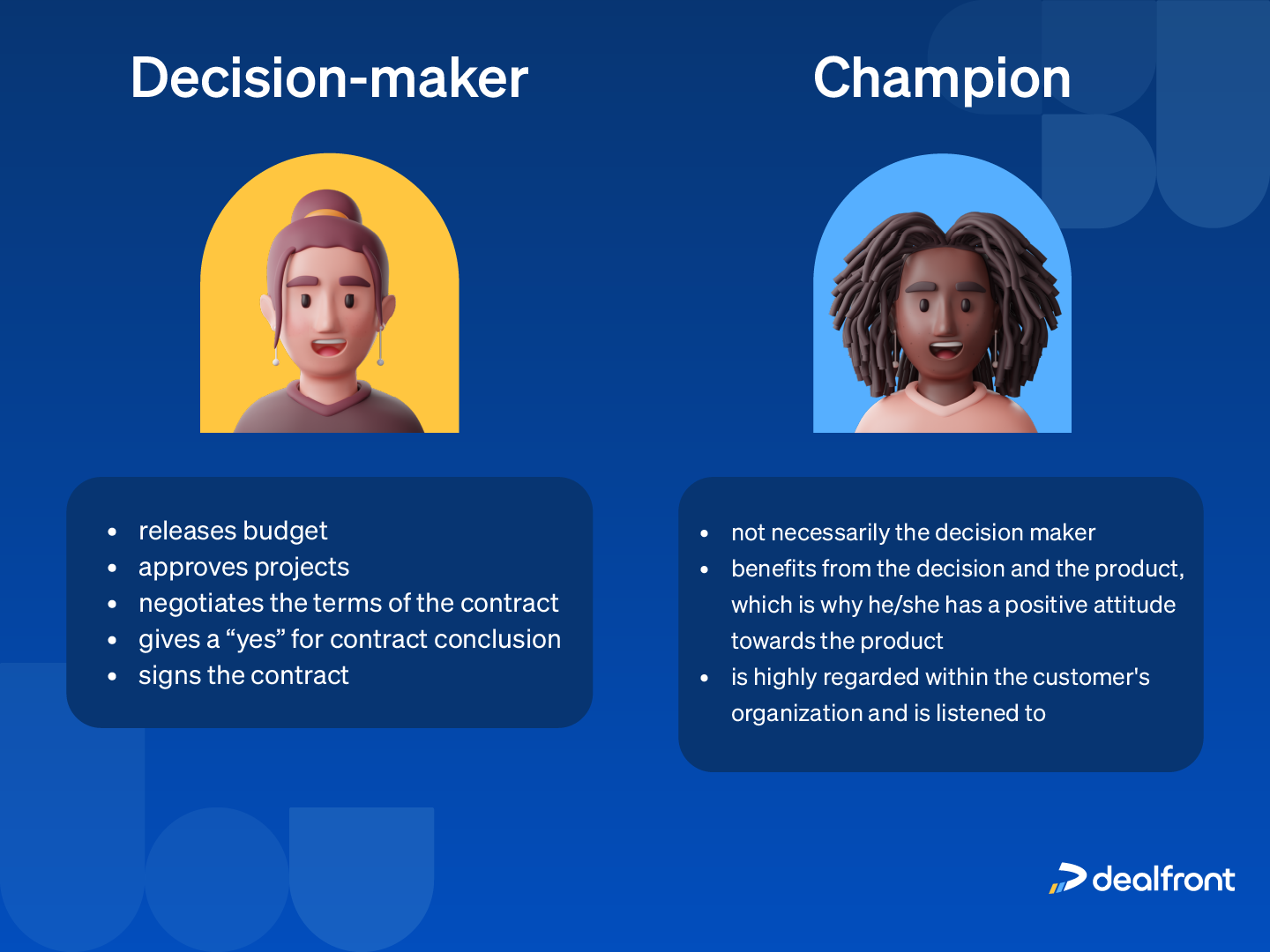
In this article, we‘d like to provide you with some tips on how to find the decision-maker in a company as well as relevant contacts. In addition, we will show you some exciting tools that will help you identify the right contact and decision-maker with ease! Let's go.
How Do You Identify the Right Contacts and Decision-Makers in a Company?
Before you start searching randomly, you should ask yourself: Who do I want to talk to in the first place? Who has the answers to my questions? If you're selling a marketing automation tool...does it make sense to talk to the Head of HR? Or the IT intern? Not really. If you've already defined your Ideal Customer Profile as well as your Buyer Persona, you usually know who to approach to close the deal in the fastest way possible.
Even if decision-making powers in companies are not always distributed according to a standardized organizational principle, you usually can assume a basic structure. That means: If your contact is a team lead in Sales, the decision-maker could probably be the Head of Sales.
In the first step, you must therefore clarify who is responsible for purchasing your solution. First, identify the relevant departments and the responsible people, afterwards you can place your offer with the appropriate contact.
Remember: All roads lead to Rome. There are a variety of ways to identify the decision-maker in a company or the right contact. Let’s go through some of the options:
1. Find Contacts with Dealfront
The easiest way to find contacts and decision-makers is with Dealfront. The Sales Intelligence Platform combines various research methods and allows you to access multiple online sources with just one search query. A web crawler searches all available public sources for sales-relevant company information and thus provides you with valuable information on responsible employees in potential companies.
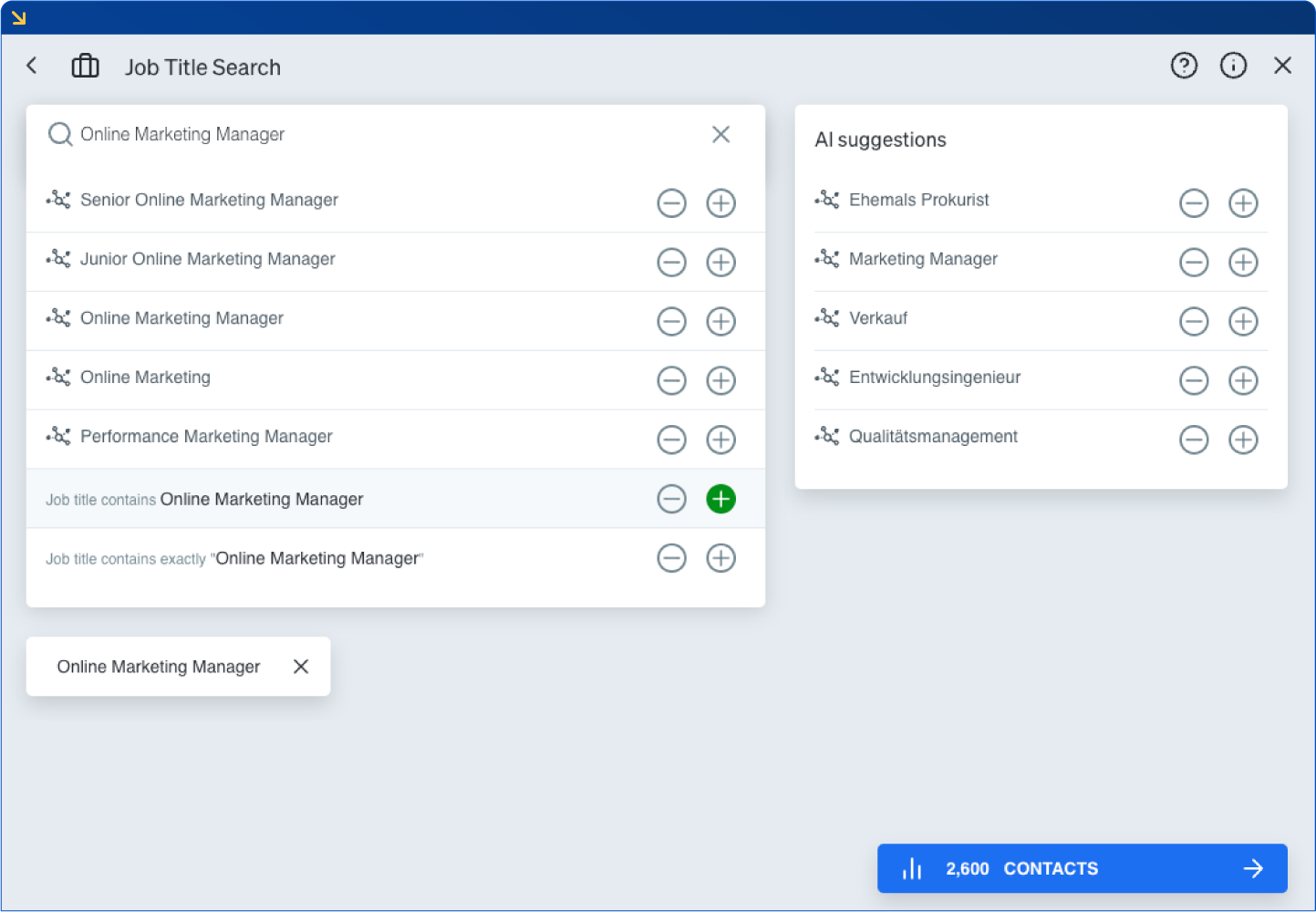
In contrast to your own research on the web, which can often be time-consuming and fruitless, Dealfront collects B2B data from various sources and compiles it clearly for you. The tool gives you access to the names of contact persons in companies and the decision-makers—even with the appropriate contact data for an effortless approach!
You can further narrow down the results using selected filters—for example, you can filter by department, hierarchy or position. In addition, Dealfront always provides you with the sources of the individual pieces of information, which enables you to conduct further research.
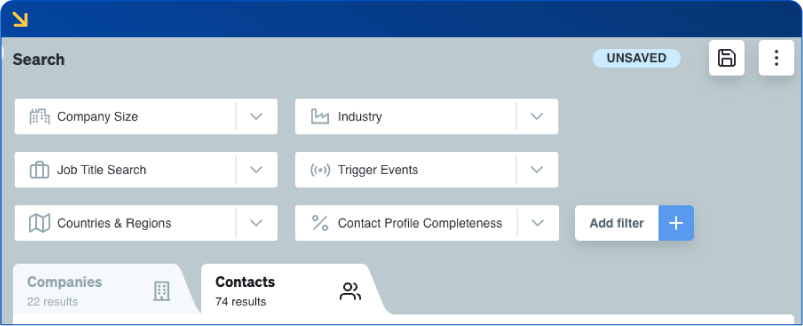
The time you save by using Dealfront will reflect in your sales figures in the long run. By shortening your research phase, you can conduct more conversations in the same amount of time. Plus, the quality of Dealfront’s data increases your success rate. Additionally, all B2B data from Dealfront on decision-makers and important contacts is completely GDPR-compliant and follows their True Compliance promise!
Furthermore, their Sales Intelligence Platform is not limited to Germany alone, but provides you with exciting insights on contacts or decision-makers from all over Europe!
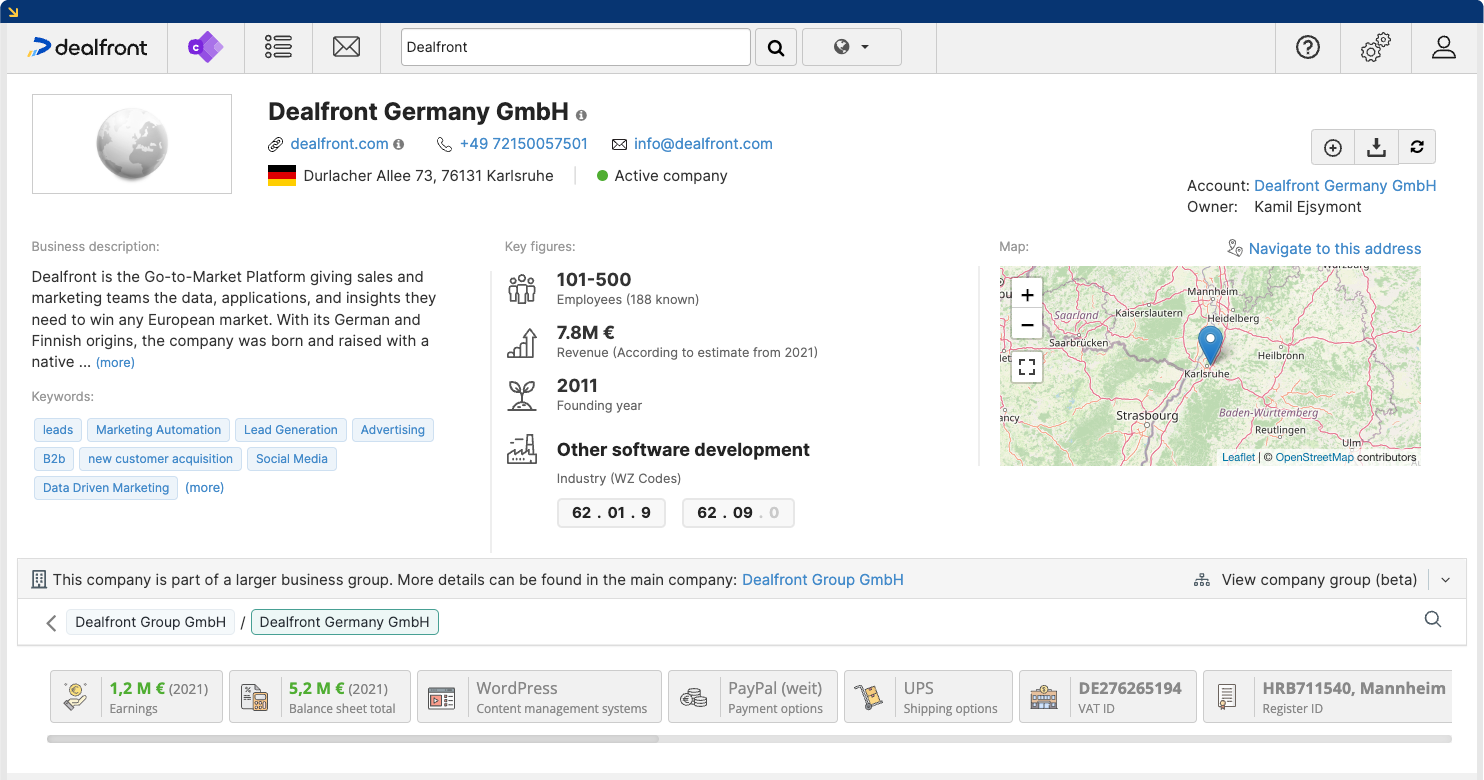
2. Calling the Central Number
Most of the time, you don't always get the direct phone number of an employee or a certain department right away. Many companies use a central number for incoming calls and forward them from the responsible employees. But how can you make sure that they forward you to the right person aka. the decision-maker?
It is not uncommon for companies to maintain a rather restrictive corporate policy here and use the central number as some sort of protective wall to filter out spammy calls. Overcoming this kind of isolation often takes a lot of effort and persuasion from your side.
If you succeed and get forwarded to an employee in the relevant department, you have to overcome the next hurdle. Whoever takes the call must be able and willing to answer your questions about where the responsibility and decision-making power lies—and often, unfortunately, you may not get through directly to the respective decision-maker.
3. Research via Google and Other Search Engines
The Internet is probably the number one research source in B2B sales, with Google is the preferred search engine. Whatever is written about a company on the Internet—you will find it there! Obviously, you can use the internet to search for decision-makers in companies and contacts, too.
Possible search terms to find relevant contacts could be:
the name of the company,
the location (if the company name is not particularly unique or there are branches at different locations, the location is a must),
the job title under which a suitable contact or decision-maker can be assumed.
In turn, you can find the result you are looking for in various sources: in news from the company, on its website, in publicly accessible company directories or even in social media.
However, the results have a few things in common: They are only as precise as the search terms used, they are often hidden among a large number of worthless entries, and compiling them requires a disproportionate amount of effort.
4. Company Websites as Another Source of Information
The most reliable information about a company can usually be found on its website. However, the quality of corporate information available online can vary widely, depending on whether a company maintains its online presence or not.
Some companies limit their website to some sort of virtual business card that provides only basic contact information. Others maintain extensive corporate websites that even provide an insight into the personnel structure and name individual contacts within the company.
Often you will find the right contacts and decision-makers for your request on the "About us" or “Company” page. How about you have a look next time you visit a company website?
5. Research on Business Networks
Whether it’s a part of your communication strategy, a basis for exchanging ideas with other experts, or an investment in your own professional future: business networks are a must in the modern business world! Around 20.7 million people in German-speaking countries use XING and around 18 million have a profile on LinkedIn (source: Statista).
These of course include job seekers as well as freelancers and self-employed people. But some users are also employees in companies that are your potential next clients! For this reason, business networks should be an indispensable source of information for you.
As a skilled salesperson, you not only use LinkedIn and Xing to find new contacts: Profiles of decision-makers for instance provide you with a lot of important information you can use to personalize your outreach and marketing strategies. For example, a recent post or comment by the decision-maker can be used optimally as a conversation starter. One thing is for sure: As a sales rep or manager, you should definitely include social selling in your portfolio.
Note: Keep an eye on the current legal situation! There is some case law that classifies direct messages for advertising purposes via social media as unlawful. Also, pay attention to the guidelines of the respective social media service regarding this. In the entire DACH region, contacting people for advertising purposes via email is generally not permitted without consent
The Disadvantages of a Manual Research When Looking for Contacts and Decision-Makers
Each one of the search methods above mentioned has advantages and disadvantages. It is often pure luck to find the right contact or decision-maker in B2B for your concern right away.
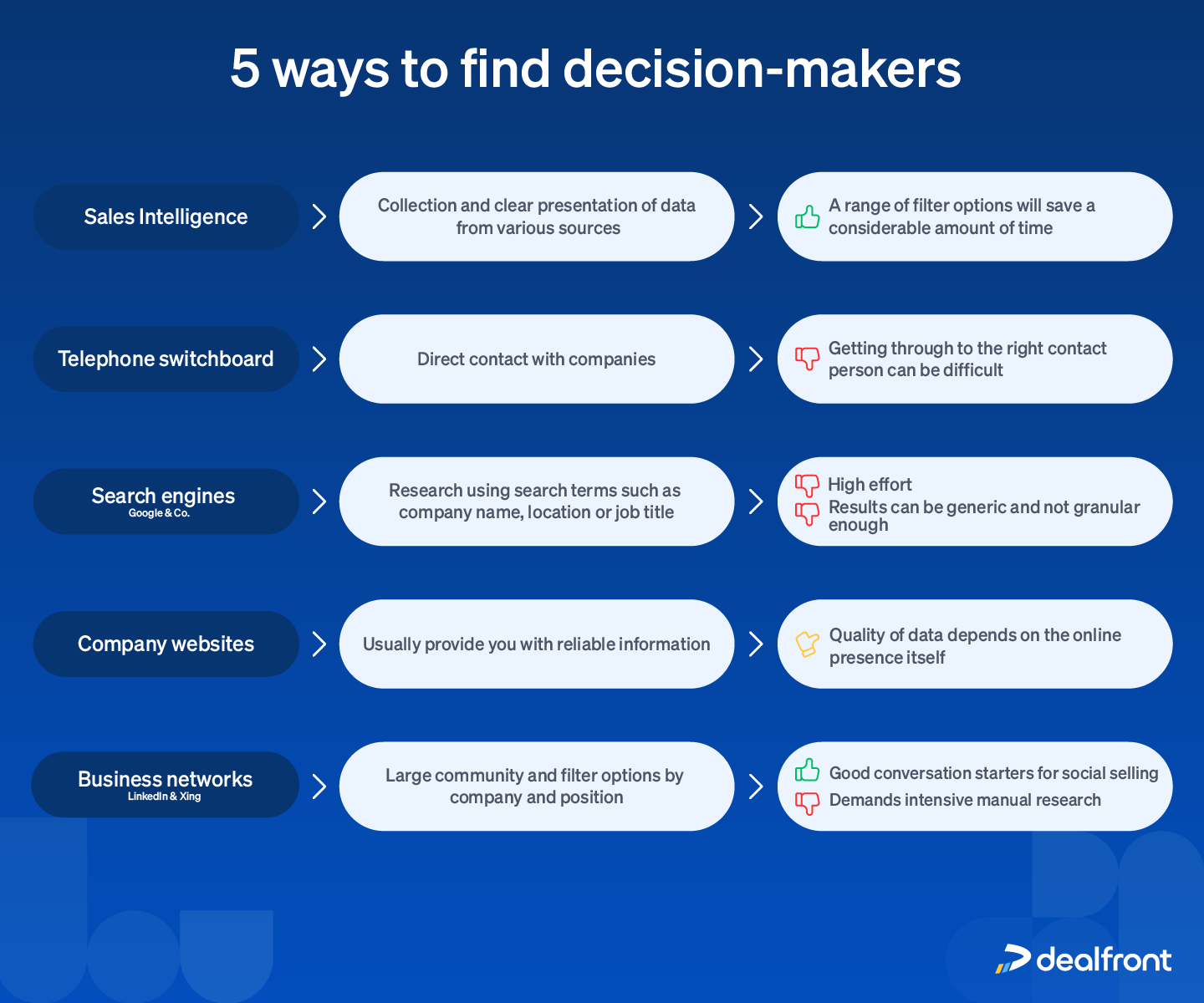
Somewhat complete and reliable information is usually only provided by a combination of different media. One source provides information on the responsible department, another names a specific contact, which another verifies and finally provides the necessary contact information. But do you really want to spend your time manually searching for the needle in the haystack?
If you’re already experienced in B2B sales, you surely know that in most cases the preliminary work involves the most effort. This is where diligence often pays off! Efficiency in research is therefore a basic prerequisite for efficiency in your sales overall.
Therefore, we can only recommend Sales Intelligence in order to find relevant contacts and most importantly: decision-makers! With a tool like Dealfrontt, for example, you not only find the right contacts and decision-makers in a company with just a few clicks, but also receive all the useful information about a company while you’re there. Another plus: Dealfront is based on Artificial Intelligence, which provides you with useful features. For instance, you can use Buyer Intent Signals, to find the right conversation starter. Or profit from the “Find Similar Companies” feature that provides you with additional relevant target companies from your ICP.
Achieve maximum efficiency in finding contacts and decision-makers in B2B with Dealfront!
Conclusion: How to Find Contacts and Decision-Makers at the Touch of a Button
One thing is for sure: Cold-calling on the phone is and remains the preferred sales method for many companies in B2B. A personal conversation with your prospect, even if not face-to-face, is the best start to establish a relationship. You can respond spontaneously and directly to the needs and pains of your counterpart and get immediate feedback on your product. In contrast to social selling, for example, where your counterpart may even ignore you completely.
The basic prerequisite for sales success in B2B is, in addition to extensive preparation and the appropriate conversation techniques, your selection of the appropriate contact in a company. If you address the wrong person, even the most experienced salesperson will not get the deal. This means: Look for the right contacts and decision-makers in advance, so that you don't waste any time! Identifying decision-makers in a company before reaching out should be one of your priorities!
As you have noticed, the manual search for suitable contacts and decision-makers is time-consuming and exhausting, despite the numerous freely accessible media. With Sales Intelligence tools like Dealfront, every sales person on your team has access to automatically generated research results from a variety of different sources. With just a few clicks, you have all the information you need to win prospects over. So, what are you waiting for?
